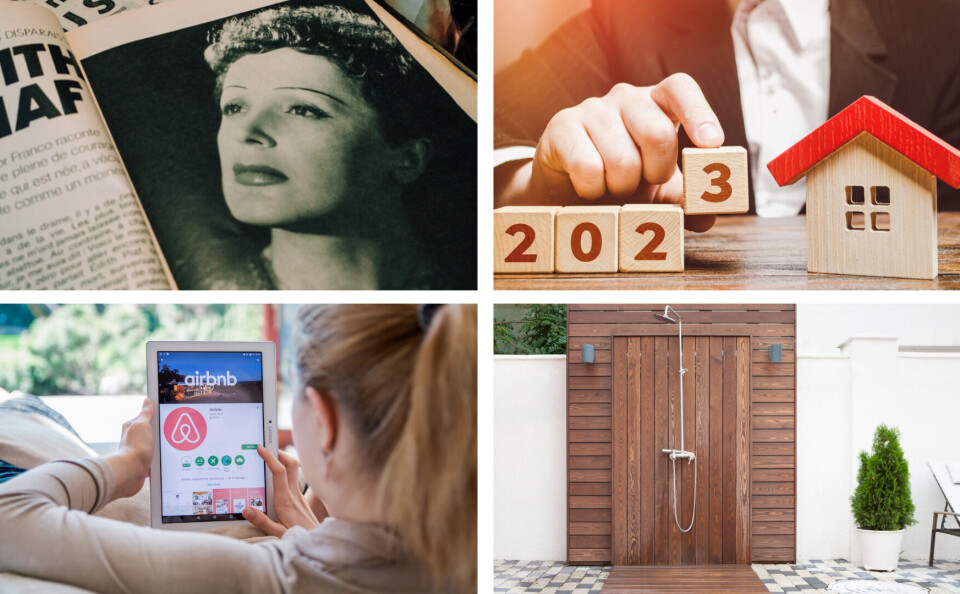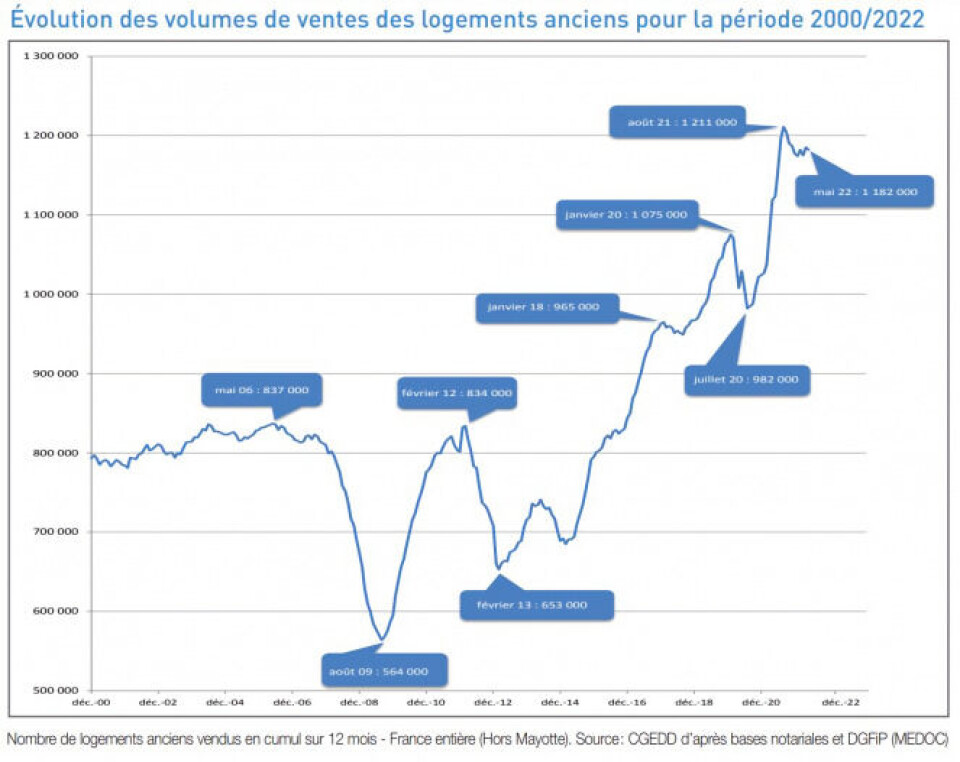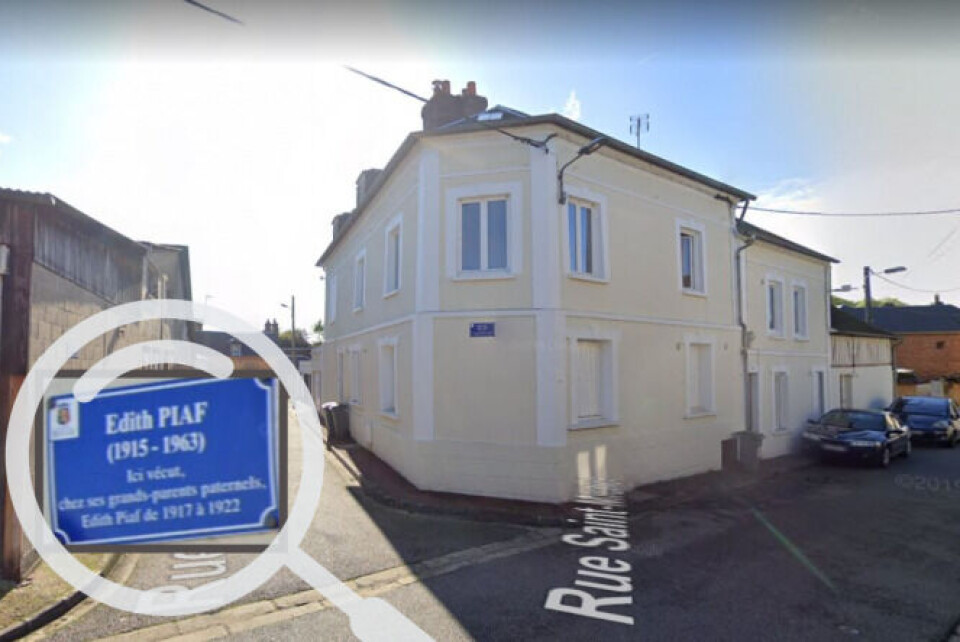-
Airbnb can be seen by tax office as 'similar to a hotel' if too many services are offered to clients
Classification as 'non-professional' furnished landlord used to be a simple way to declare revenue
-
What are the rules for changing your front door in France?
We review the rules, from planning permission to paint colours
-
Tough Airbnb rules in Marseille prompt many property owners to sell
City council reduce time that a property can be rented to short-term guests
Édith Piaf’s house for sale, 2023 prices: Four French property updates
We also look at the evolution of property sales in the past 20 years, an anti-Airbnb breakthrough in south-west France and rules on outdoor showers

2023 French property prices expected to fall in some cities but rise in towns and villages
The French property market is expected to be slightly less dynamic in 2023, leading to a drop in prices in certain bigger cities, according to one of France’s main property valuation specialists.
“We can expect a drop in demand in the cities most affected by the rise in [mortgage] interest rates," Thomas Lefebvre, vice president of data and science at Meilleurs Agents, told Figaro Immobilier.
This will bring down prices.
Mortgage interest rates are on the rise because of inflation, which, while expected to slow down in 2023, is still likely to remain high.
In Paris, property prices are expected to drop by around 3% year-on-year. By September next year, Meilleurs Agents predicts that the price per square metre will remain just slightly above €10,000 per square metre. The price reached up to nearly €10,800 per square metre by the end of 2021.
“Paris is an example of a city with a high supply of available properties. Since 2018, the number of properties for sale has soared by 52%," said Pierre Vidal, head of Meilleurs Agents' research teams.
Elsewhere, property prices are expected to decrease by around 2% in Lyon next year and by around 1% in Bordeaux and Toulouse.
Property prices are expected to go up in certain large cities, such as Montpellier (+3%) and Marseille (+4%).
Read more: ‘Slowdown ahead’: Five French property trends from latest notaire data
Read more: See the French cities where properties sell quickest (and slowest)
On the whole, though, the prices in major cities will remain stable with an average rise in price of 1% in the 10 biggest cities in the country.
Outside the major cities, prices are expected to continue rising in most parts of the country. Meilleurs Agents is expecting prices to go up by around 5% in towns and villages and to increase by around 3% in medium-sized cities.
Overall, there should be fewer property sales next year, with Meilleurs Agents predicting the total yearly number of sales of non-new properties to dip below the one million mark.
France’s yearly sales of non-new properties reached a peak of over 1.2 million in August 2021 but this has gradually been falling ever since.
The graph below shows the progression of non-new property sales between 2000 and 2022, according to in-depth data by the Notaires de France.

Credit: Notaires de France
Édith Piaf’s childhood home on sale
A property in Normandy where French singer Édith Piaf lived as a child is currently on sale for €285,000.
The 210-square-metre property in Bernay (Eure) has been divided into three flats and is available to buy with tenants currently already in place.
Piaf lived there between 1917 and 1922, from the age of around two or three until she was seven or eight, with her paternal grandparents.
Her grandmother ran a brothel in the building and Piaf later claimed that her weakness for men came from growing up among prostitutes. While Piaf lived in Bernay she allegedly suffered from blindness as a result of keratitis and said she was cured after a religious pilgrimage.
The property was bought around 50 years but the buyer died over a decade ago and their inheritors now wish to sell up.
Benjamin Plessis, the real estate advisor in charge of the sale with agency Orpi, said that if he was a buyer and he “had the choice between two buildings of the same quality and the same price” he would definitely choose Piaf’s former house for the history it holds.
“I have had several calls already even though the building has only been on the market for a few days,” he said.
The three flats in the building are 60, 70 and 80 square metres and all have a garden. The property also comes with 10 garages.
Occasionally, tourists come to the house, where a small plaque on the wall signals that it was once the house of Piaf’s grandparents.
See more details of the property sale on Orpi’s website at this link.

Credit: Screenshot / Google Street View
Suspension on ‘anti-Airbnb’ rules lifted in Pays Basque
A court has lifted a suspension on rules imposed earlier this year that aimed to limit the number of short-term tourist lets in the Pays Basque region in south-west France.
Read more: Residents’ anger after French court suspends short-term rentals rule
The Pau administrative court had halted the measures on June 3, overturning a decision voted in in March by authorities in the Communauté d’agglomération du Pays basque (CAPB).
The CAPB includes 158 communes across the Pays Basque (Pyrénées-Atlantiques). The group had, on March 5, authorised rules designed to balance long-term rental options with the spread of short-term rentals, such as those on Airbnb.
This included measures to restrict companies setting up new short-term rentals in 24 communes that are under housing pressure, including Bayonne and Biarritz.
The idea had been that landlords would also have to compensate for creating a short-term rental property by proposing a space that can be used for long-term accommodation in the same town.
This must be equal to the same number of square metres ‘lost’ to short-term rentals, and cannot involve building new properties.
This was intended to stop local people being pushed out of the area by high-yield short-term lets.
The court decided to temporarily suspend these rules after 65 owner agencies, property agencies and concierge services joined together to request the legal suspension of the measures, saying they amounted to a “serious attack” on their commercial and professional operations.
This suspension has now been lifted, although with minor changes to the rules to make up for the lack of available properties that landlords could turn into long-term accommodation to compensate for having a short-term rental property.
Now, new regulations will allow landlords to buy up commercial property to turn into accommodation and will also allow them to turn ground-floor premises into accommodation, as long as there is not a shop window facing a public street.
These new compensation rules are set to come into effect from March 1, 2023.
This is not the end of the legal dispute between landlords and local authorities, though. A further hearing on the legality of these rules is set to be held in the coming months.
There are over 16,000 properties rented out for short-term stays to tourists in the Pays Basque area, the latest figures from the Agence d’urbanisme Atlantique et Pyrénées show. This marked an increase of 130% between 2016 and 2020.
Many of these properties are rented out on Airbnb, hence the regulations being nicknamed ‘anti-Airbnb’ measures.
Read more: Bordeaux creates new Airbnb hit squad
What authorisations are needed to install an outdoor shower?
You may wish to install an outdoor shower in your garden, whether it is to clean off before or after a dip in the pool or to wash off mud after a long walk with a dog.
Like with most additions to property in France, there are rules governing this.
In the main, though, if you plan to construct a standard sized outdoor shower for one person, you should not need any authorisation.
This is because if the surface floor area is under five square metres and it is lower than 12 metres high, then you do not need any sort of pre-construction permission.
It should be noted that the vertical area of the shower, called in French the emprise au sol, must also not exceed five square metres.
If the surface area is less than five square metres and the shower is higher than 12 metres, you will need a déclaration préalable de travaux, an administrative authorisation that is easier to get than a permis de construire.
If the surface area of the shower is between five and 20 square metres and it is under 12 metres high you will also need a déclaration préalable de travaux. If the surface area is above 20 square metres and it is higher than 12 metres, you will need a permis de construire.
There are also stricter rules depending on whether you live in a protected area in France or near a historic monument.
For example, if you live within the perimeter of a site patrimonial remarquable, you live in the proximity of a monument historique or you live on a site classé.
Before undertaking any renovation or construction work in your garden, it is a good idea to check your plan local d'urbanisme, which you can do via your mairie.
If you illegally install a larger outdoor shower, for example you did not receive the correct permission, you can face a fine of between €1,200 and €30,000.
In case of repeat offences, you can also be sentenced to six months in prison in addition.
The final element to note is that if you plan to use soap or other washing products in your outdoor shower, it is best to connect it to the sewage drain.
Check with your local mairie to find out how to apply for a connection to a sewage drain in your town. Here is an example of a sewer connection application form.
Read more: Second home hotspots, pergolas, cracks: Five French property updates
Read more: French DIY: My mission to build a cost-effective garden pergola
Related articles
Illegal cabins tracked, tree dispute: Four French property updates
How to find the price of a property that has sold near you in France
Homeowners applying for French renovation grants will need consultant
























